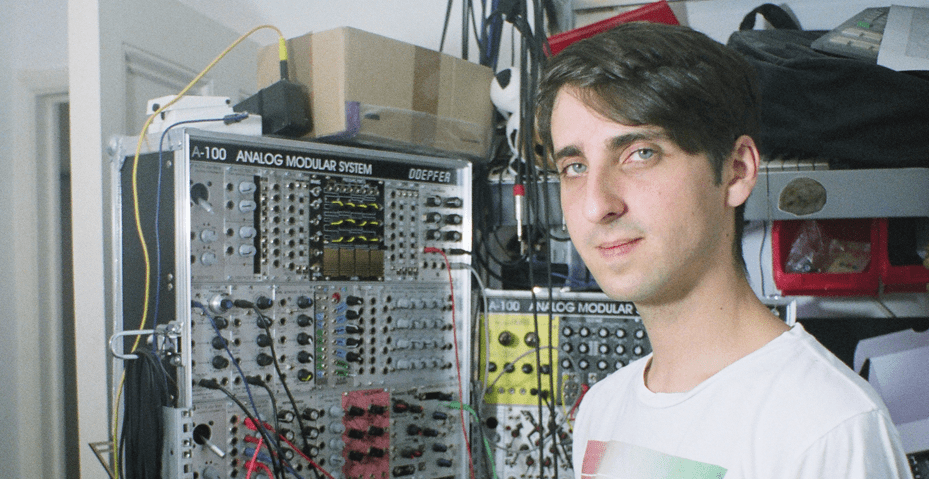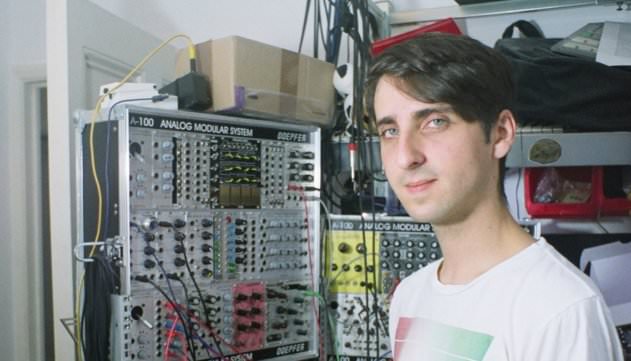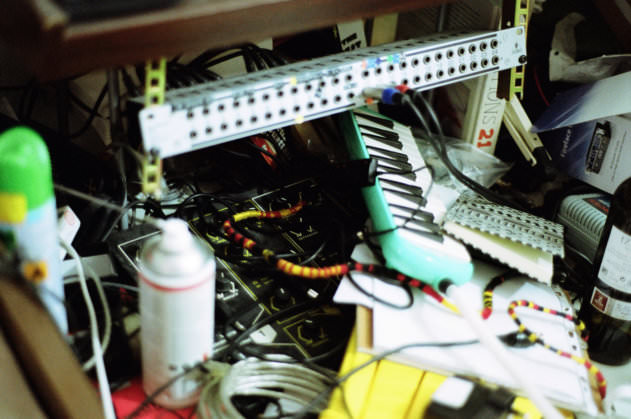As the Border Community boss releases his long-awaited follow-up to 2006’s The Idiots Are Winning, Greg Scarth joins him in his home studio for an in-depth discussion of everything from David Guetta to neurophysiological studies of clubbers.
When James Holden emerged on to the scene back in 1999 with what he refers to as his “naive teenage trance” anthem ‘Horizons’, few might have predicted the path his career would take. Since then he’s become one of the mainstays of a certain indefinable microcosm of experimental, often organic dance music, founded the hugely influential Border Community label and developed into a unique, consistently exciting DJ.
Holden’s music isn’t academic or intelligent in the po-faced senses those terms are typically used, but there’s a clear process behind it; James puts a huge amount of thought into the inherent meaning of his music and the technical choices made along the way, but his ultimate objective isn’t chin-stroking discussion but human reaction, whether that be at 4am on a dancefloor or at home listening alone.
It’s clear that Holden has an intense personal attachment to music, regardless of genre. Over the course of our afternoon in his west London home studio, he praises LIES for bringing roughness back to dance music, laughs self-deprecatingly as he recalls the superstar house DJ who told him one of his DJ sets was the weirdest thing she’d ever heard (“in a bad way”), and celebrates the demise of the “home counties post-dubstep” trend.
Informed by krautrock aesthetics, Malian rhythms and the idea of British sounds and melodies, Holden’s new album The Inheritors is the follow-up to his 2006 debut, The Idiots Are Winning. We met him to discuss the making of the album, the musical and technical ideas which have driven his development as an artist over the last few years, and his own frustration at the time it’s taken him to follow up his debut.
Attack: The obvious question to start with is why it’s taken you seven years to follow up the first album.
James Holden: It’s too long. Now it’s coming out I feel so much better that I’ve got something out there so people know what I’m trying to do, so when I DJ people know what to expect. In that gap it started to get worse and worse. People had nothing to go on, so it was my own fault that they were expecting old stuff that I wasn’t interested in.
I mean, basically it was just running the label and DJing that took up all my time. The people who are organising your DJing make more money if you do it more so they want you to do it more and the smaller acts on the label can get more shows if I let them do support shows for me, so that becomes a pressure. The other acts on the label want to have a record out so they can get more bookings and make more money. It went from being just a little group of friends all working together and helping each other to people coming in who saw it as a meal ticket. In the last year Gemma [Sheppard, Border Community label manager and Holden’s partner] and I have said goodbye to five or six people and everything’s good again now. Without us noticing, it had become like we had leeches all over our bodies, and it was so draining. In the end, some of that wasn’t worth the effort so we’ve cut it back to people like Nathan Fake, Luke Abbott, Wesley Matsell
– the people who inspire me.
That’s the core of the label really.
Yeah, it’s different from the early days but it’s kind of the same feeling of this little group of people who bounce ideas off each other. We’re all sort of competing a bit. Especially with Luke Abbott, I’m always competing to try and get a step ahead of him. Nathan is impossible to compete with because he’s, like, half autistic, so I just can’t do the things he can do. But yeah, it’s just positive again and it’s also not taking all our time any more. Now I feel like I’m not going to make the same mistake again and the next record’ll come much quicker.
Without us noticing, the label had become like we had leeches all over our bodies.
Was there a pressure to expand the label? Did you feel that the label had to grow?
Not really. We always were conscious that we didn’t want to become a normal record label with overheads, releasing shit just to get the cashflow going through. It was just the social pressure. We did believe in every artist we worked with, but the pressure came from the artists more than anywhere else.
We always had this Factory Records-esque idea that we’re just going to sign the record that we do and you’re not committed to us and we’re not committed to you and you can go off in a different musical direction with a different label and it’s totally fine, but I think that got lost a bit and not all the artists really understood. We watched 24 Hour Party People again about a month ago – every time we have a little crisis with the music industry Channel 4 show it again; it’s really helpful – and we’d forgotten that the last bit of their contract written in blood was that the artists are ‘free to fuck off’. We’d sort of forgotten about that and got sucked into just thinking about how the record label should be nice, but actually the artists have to, you know… they have no entitlement. Music doesn’t owe anyone a career.
It sounds like your focus changed a lot over that seven year period. How has your view of your own role changed? Artist, DJ, label owner – what do you see yourself as?
I’m a musician. Nothing else is as relevant as the record. I thought I was working really hard at becoming the best DJ I could, but really that’s such a small achievement. Having done the record I just feel like that’s a much better achievement. Now I feel confident in myself having put that out there and solidified it.
For a time I was looking around for a new sound and in the remixes I’ve done since the last album you can hear me try things that half worked and then gradually it comes together into something that’s beginning to make sense. I suppose I needed a bit of that time to feel my way forward, but [laughing] probably not the whole seven years!
It’s interesting that you’re so certain about the fact you think of yourself as a musician. The term ‘producer’ is quite restrictive. Calling someone a producer is overlooking the musical element.
Yeah, it overshadows it.
The producer historically was…
[Interrupting] It wasn’t a musical role! Maybe a kind of guiding aesthetic hand. But most of the people who tell me they’re producers don’t even think of the aesthetic of what they’re doing at all, they just think, ‘Oh, I’m doing techno so I’ll just do techno things.’ It’s the wrong word. I much prefer musician. That’s what I consider I’m doing.



08.12 PM
Holden is a great producer! Nice words from him. And congratulations for the interview folks 😉 keep doing
12.37 AM
Too many quotables in this interview.
“But most of the people who tell me they’re producers don’t even think of the aesthetic of what they’re doing at all”
“Loads of people in dance music think that even though they’re not making Guetta-house they can use the same production techniques as Guetta and it’s still OK. To me that’s like… functional, spray-tan music.”
“it’s just like, what are the Berlin lot even doing now? What are you thinking? You’ve forgotten what it’s about!”
“I can just shit out a melody”
I don’t always love James’ music but he’s always interesting. You can really tell from this interview that he analyses everything he does, maybe too much, but that’s what being an artist’s about. Too many people only think about the money or making big crowds of idiots dance. Electronic music can be about so much more than that.
Going to check out the new album now.
12.37 AM
It’s good to be misunderstood! U only have to understand it yourself
11.56 AM
Im inspired to try and sh*t out some melodies later – it could get messy 😉
12.02 AM
Inspiring interview. I feel like a lot of people might not get Holden’s sense of humour and he sometimes comes across quite badly in interviews but this one really reveals a lot about him as a person and an artist. Refreshing to hear such honesty about running the label and the pressures to keep up the DJ appearances in order to make money. A quick look at the BC releases over the last few years and you can kind of guess which artists he might be referring to when he talks about that sense of entitlement.
01.26 PM
thanks so much for this. makes me want to rush home from work and make some music
02.50 PM
yeah, thanks a lot for letting us knowing bit more of james. it seems he also enjoyed it and thats the reason why the interwiew is soo good
03.57 PM
this is the case where intelligence makes a musician stand out.